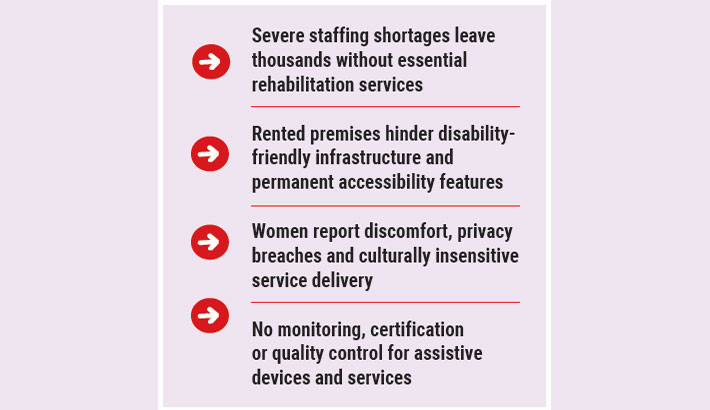PSOSK centres plagued by unpleasant gaps: Study
Daily Sun Report, Dhaka
Published: 15 Nov 2025

A new study has found significant shortcomings in five key areas of service delivery at Bangladesh’s Protibandhi Seba o Sahajjo Kendra (PSOSK), warning that millions of people with disabilities are being left without adequate access to essential rehabilitation support.
The assessment, conducted by the Bangladesh Disabled Development Trust (BDDT), identified found widespread unpleasantness across five core parameters – availability, accessibility, acceptability, adaptability and quality – of PSOSK services across the country’s disability service centres, many of which operate with limited staff, inadequate facilities and constrained budgets.
Availability
PSOSK currently runs 103 service centres across 39 sub-districts, leaving people in 456 sub-districts without access.
Of the 12 designated positions at each centre, only 8-10 are typically filled. Around 800 employees are in post across all centres, far short of the 1,200 required.
Severe shortages of trained professionals, including physiotherapists, occupational therapists, and speech and language therapists, mean that demand far outstrips capacity. Each centre serves only 10-40 people per day, despite needs being “many times higher”.
There are no posts for psychotherapists, leaving people with psychosocial disabilities without support. High-tech assistive devices are unavailable, and most existing services cater only to people with physical, visual or hearing disabilities.
Accessibility
Most centres operate from rented premises, limiting the installation of permanent disability-friendly infrastructure such as ramps, accessible toilets and specialised therapy rooms.
Access to information about PSOSK services is poor, and the service delivery mechanism remains inaccessible for people with visual, hearing, intellectual or psychosocial disabilities.
Acceptability
Female service users reported discomfort receiving therapy from male staff, often resulting in their exclusion from care. Privacy concerns were raised, with women saying their right to confidentiality was not respected.
The study further notes that the absence of age-appropriate and child-specific services, as well as a lack of cultural sensitivity, limits access for many groups.
Adaptability
Gender-sensitive service delivery, including separate spaces or time slots, is not consistently provided, despite cultural norms in many areas requiring such arrangements.
Assistive products were also found to be non-adaptable, failing to meet diverse user needs.
Quality
The report highlights an absence of regular monitoring, quality control, or any authority responsible for certifying assistive devices and services.
PSOSK, managed by the Jatiyo Protibondhi Unnoyan Foundation (JPUF), operates with a small budget that “barely covers operations”, making expansion or improved staffing difficult.
The findings were presented on Saturday by Rejaul Karim Siddiquee, a BDDT consultant, who read out the report compiled from data across 32 centres in eight divisions, along with input from stakeholders.
The study was conducted in association with Dhaka Times and funded by the European Union.
The report issued 13 recommendations, including the immediate formulation of a comprehensive policy aligned with Article 26 of the UN Convention on the Rights of Persons with Disabilities (CRPD), expanding therapy services, strengthening governance, improving information access in accessible formats, and launching national awareness campaigns.

